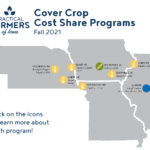Cover crop cost-share funds available for farmers in Iowa, Missouri and Nebraska
PFI aims to enroll 1,000 farmers into programs for corn and soybeans
Contact: Sarah Carlson | Strategic Initiatives Director | Practical Farmers of Iowa | (515) 232-5661 | sarah@practicalfarmers.org
AMES, Iowa — Farmers thinking of planting cover crops this fall can access cost-share funds from one of seven private cost-share programs in Iowa, Missouri and Nebraska thanks to cost-share initiatives Practical Farmers of Iowa has launched over the past seven years with supply chain partners.
Cost-share programs are available for both corn and soybeans. PFI is looking to work with 1,000 farmers in 2021 through these programs, which include:
- ADM / Unilever – Des Moines, Iowa – Soybeans: For farmers who plan to sell soybeans directly to the Des Moines ADM facility or into one of 12 facilities that feed into the supply chain
- Cargill / PepsiCo – Eddyville, Iowa – Corn: For farmers who plan to sell corn directly to the Cargill Eddyville facility, or to one of 13 facilities that feed into the supply chain
- ADM / PepsiCo– Clinton, Iowa – Corn: For farmers who sell corn into the Clinton, Iowa, ADM supply chain or any River Valley cooperative locations
- LifeLine Foods / PepsiCo – Mound City, Missouri – Corn: For farmers who sell corn directly to LifeLine Foods’ facility in Mound City, Missouri
- Cargill / PepsiCo / Bayer – Blair, Nebraska – Corn: For farmers who sell corn to the Blair, Nebraska, supply chain, or to one of seven facilities that feed into the Blair supply chain
- Bunge / PepsiCo – Crete, Nebraska – Corn: For farmers who sell corn directly to the Crete, Nebraska, facility
- ADM / Keurig Dr. Pepper / PepsiCo – Columbus, Nebraska – Corn: For farmers who sell corn directly to the Columbus, Nebraska, or Lincoln, Nebraska, ADM facilities
Cost-share terms vary by program
In some, those new to cover crops can receive $40 per acre on up to 40 acres while farmers who have used cover crops before can receive $10 per acre on 160 acres, or 10% of acres farmed, whichever is larger. In other programs, farmers will be reimbursed $10 per acre for up to 200 acres.
More details – including an interactive map with links to easy enrollment forms for each program – are available at practicalfarmers.org/all-cover-crop-cost-share-programs.
“PFI is working closely with all the grain merchandisers tied to these grain purchasing locations,” says Sarah Carlson, strategic initiatives director with Practical Farmers of Iowa.
“There are no deadlines to sign up. When the programs are full, that’s when we’ll close them. If farmers get motivated to plant cover crops after harvest, and we still have acres available, we’ll take them.
“The cost-share funds remove the risk of adding cover crops, and we want to get the word out that these programs are available.”
Eligibility: Farmers are eligible to enroll in one of these private cost-share programs even if they are enrolled separately in a public cost-share program. Additionally, farmers may enroll in more than one PFI-managed private cost-share program for each commodity (one for corn, one for soybeans) if they want to offset costs for additional acres of cover crops.
For questions, to check eligibility or for help getting signed up, contact Chris Wilbeck, a consultant working with Practical Farmers of Iowa, at chris@practicalfarmers.org.
A separate cost-share opportunity is available to farmers in Illinois, Indiana, Missouri, Ohio, Tennessee or Arkansas through Cargill’s Regenerative Ag Program. A link to more details is available on PFI’s interactive cost-share map. PFI provides farmers with cover crop advice as part of this program.
Cost-share funds offset risks
Cover crops like rye and oats offer a range of proven benefits to farmers and the landscape. They prevent erosion, improve soil quality and keep nutrients in fields and out of waterways, improving water quality. Cover crops can also smother weeds and serve as livestock forage, saving farmers money.
But for many farmers, the costs of planting cover crops – and the risks of figuring out how to successfully add a new crop into established corn and soybean systems – can be significant barriers.
“Helping farmers overcome these obstacles and lessen the risk is the reason why Practical Farmers of Iowa launched our first cost-share program in 2015, and why we have worked to build and expand partnerships with supply chain companies across the region,” Sarah says.
“We know that farmers need financial as well as agronomic support to be successful with cover crops, which is why we built both into these programs.
“We also ask farmers who sign up to attend a learning event, and we encourage them to get connected with the PFI network so they have access to a support group of peers, which research shows increases the chances of success. This extra support is what makes PFI’s cost-share programs unique.”
Cost-share sign-ups are taking place now and will continue until all available acres are filled.
###
Practical Farmers of Iowa works to equip farmers to build resilient farms and communities. Our values include: welcoming everyone; farmers leading the exchange of experience and knowledge; curiosity, creativity, collaboration and community; resilient farms now and for future generations; and stewardship of land and resources. To learn more, visit http://practicalfarmers.org.

